Analysis of Social and Ethical Issues in PepsiCo's Business Practices
VerifiedAdded on 2023/05/29
|7
|1868
|422
Report
AI Summary
This report examines the social and ethical issues faced by PepsiCo, a multinational food and beverage corporation. It begins by outlining PepsiCo's values and code of conduct, emphasizing its commitment to ethical behavior and sustainable growth. The report then explores the company's approach to corporate social responsibility, including its human and environmental sustainability policies. Key areas of focus include quality and safety programs, responsible marketing practices, healthcare reform, environmental policies, sustainable agriculture, and waste management. The analysis highlights PepsiCo's initiatives such as replenishing water, and solid waste management programs. The report concludes by emphasizing the importance of integrating social purpose with business objectives for long-term success and customer satisfaction, underscoring the company's dedication to ethical conduct, environmental stewardship, and stakeholder engagement.
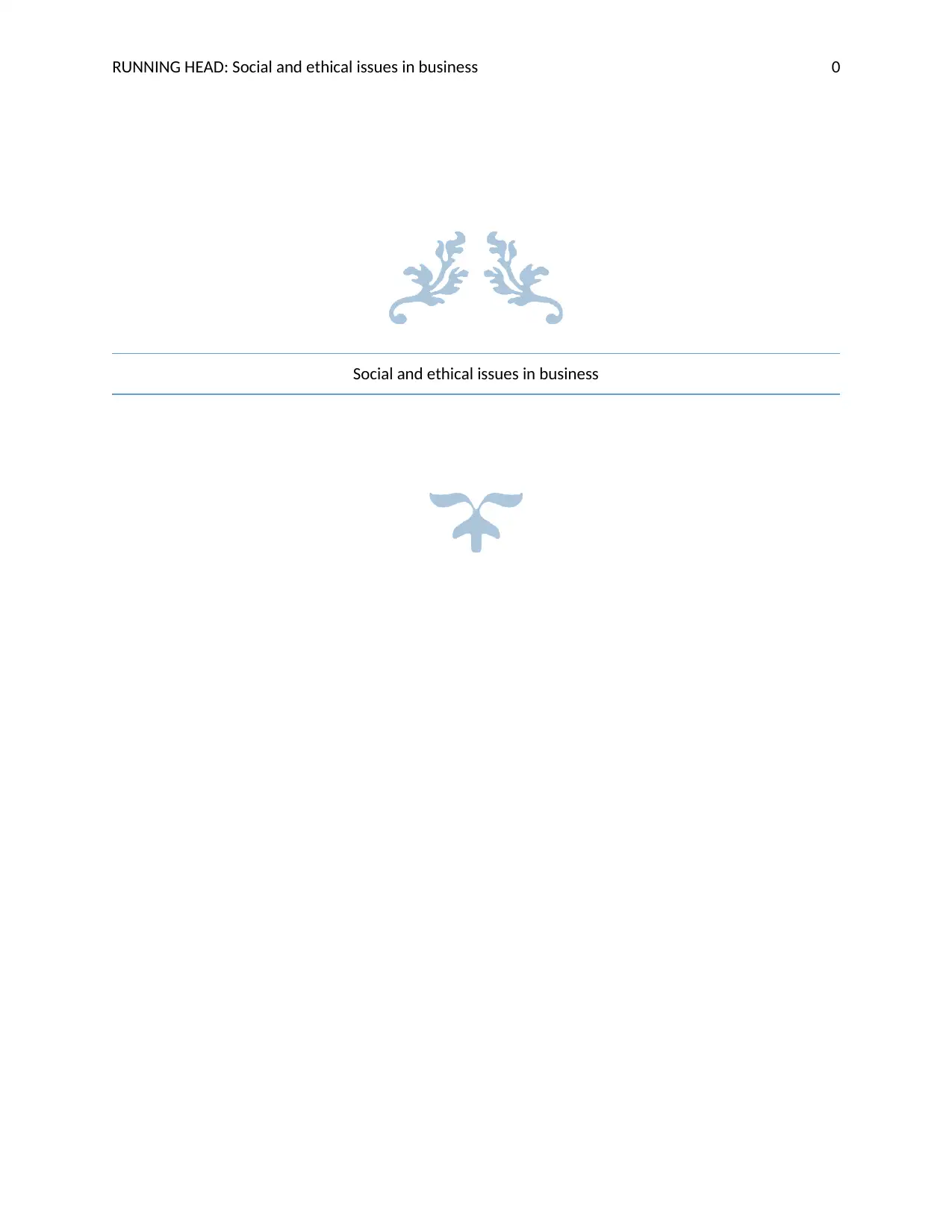
RUNNING HEAD: Social and ethical issues in business 0
Social and ethical issues in business
Social and ethical issues in business
Paraphrase This Document
Need a fresh take? Get an instant paraphrase of this document with our AI Paraphraser
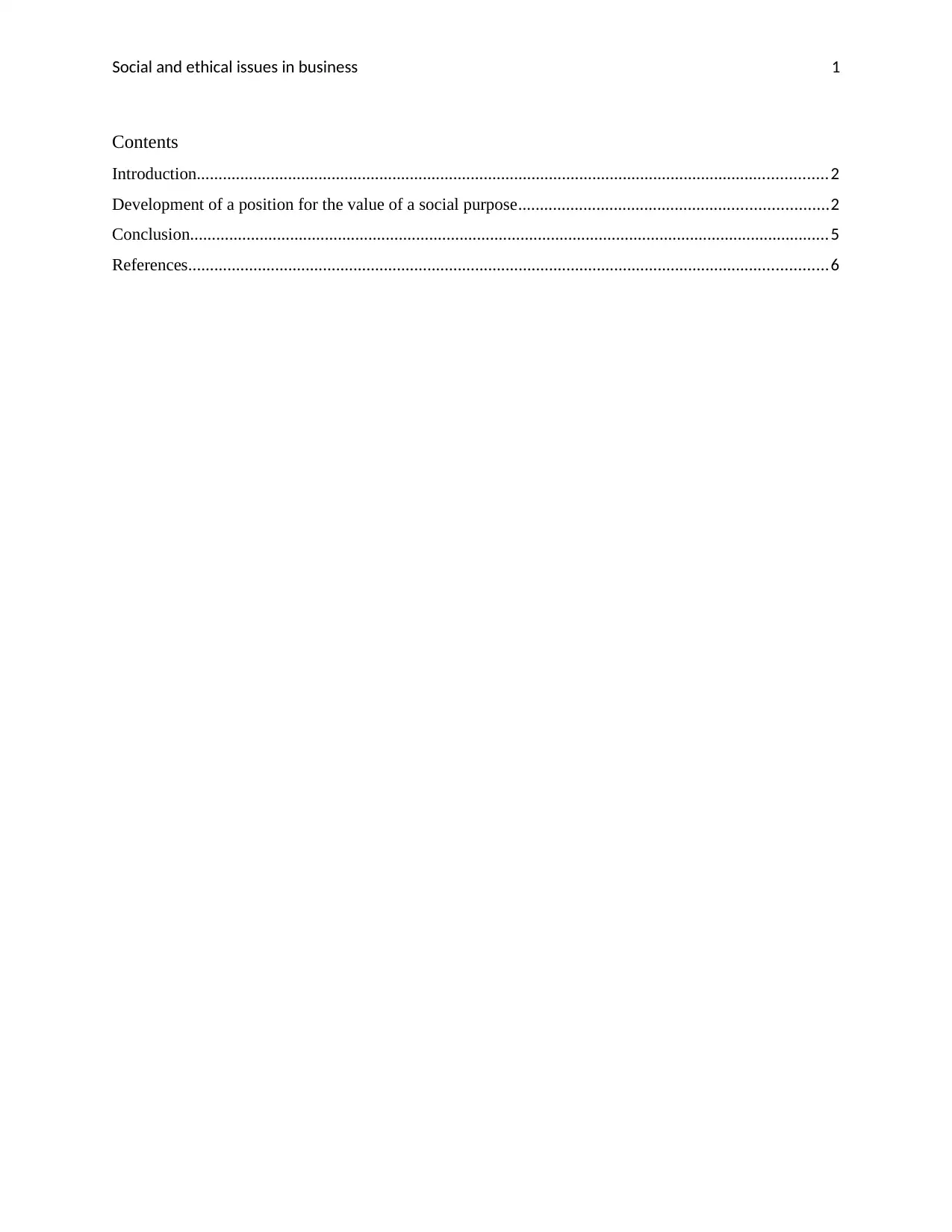
Social and ethical issues in business 1
Contents
Introduction.................................................................................................................................................2
Development of a position for the value of a social purpose.......................................................................2
Conclusion...................................................................................................................................................5
References...................................................................................................................................................6
Contents
Introduction.................................................................................................................................................2
Development of a position for the value of a social purpose.......................................................................2
Conclusion...................................................................................................................................................5
References...................................................................................................................................................6
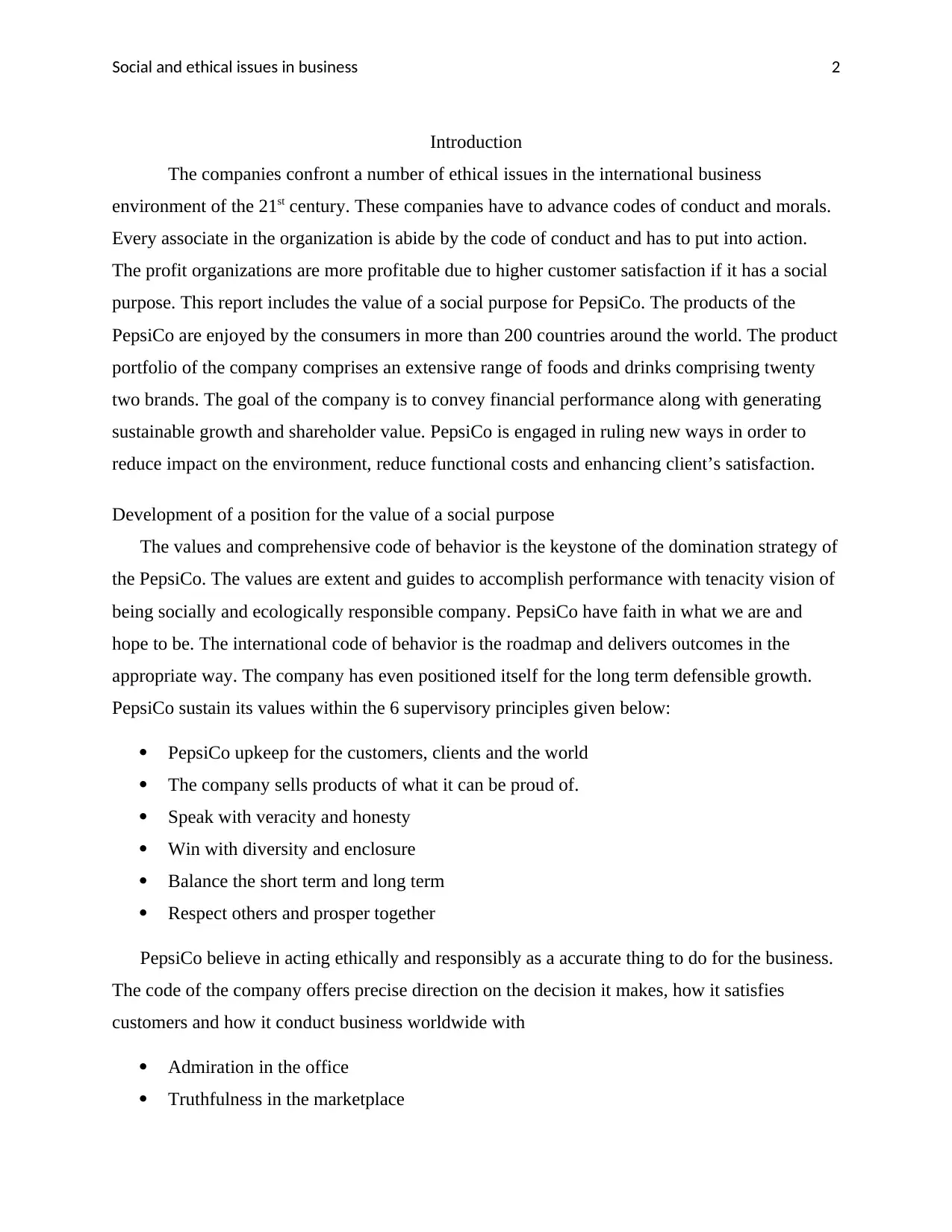
Social and ethical issues in business 2
Introduction
The companies confront a number of ethical issues in the international business
environment of the 21st century. These companies have to advance codes of conduct and morals.
Every associate in the organization is abide by the code of conduct and has to put into action.
The profit organizations are more profitable due to higher customer satisfaction if it has a social
purpose. This report includes the value of a social purpose for PepsiCo. The products of the
PepsiCo are enjoyed by the consumers in more than 200 countries around the world. The product
portfolio of the company comprises an extensive range of foods and drinks comprising twenty
two brands. The goal of the company is to convey financial performance along with generating
sustainable growth and shareholder value. PepsiCo is engaged in ruling new ways in order to
reduce impact on the environment, reduce functional costs and enhancing client’s satisfaction.
Development of a position for the value of a social purpose
The values and comprehensive code of behavior is the keystone of the domination strategy of
the PepsiCo. The values are extent and guides to accomplish performance with tenacity vision of
being socially and ecologically responsible company. PepsiCo have faith in what we are and
hope to be. The international code of behavior is the roadmap and delivers outcomes in the
appropriate way. The company has even positioned itself for the long term defensible growth.
PepsiCo sustain its values within the 6 supervisory principles given below:
PepsiCo upkeep for the customers, clients and the world
The company sells products of what it can be proud of.
Speak with veracity and honesty
Win with diversity and enclosure
Balance the short term and long term
Respect others and prosper together
PepsiCo believe in acting ethically and responsibly as a accurate thing to do for the business.
The code of the company offers precise direction on the decision it makes, how it satisfies
customers and how it conduct business worldwide with
Admiration in the office
Truthfulness in the marketplace
Introduction
The companies confront a number of ethical issues in the international business
environment of the 21st century. These companies have to advance codes of conduct and morals.
Every associate in the organization is abide by the code of conduct and has to put into action.
The profit organizations are more profitable due to higher customer satisfaction if it has a social
purpose. This report includes the value of a social purpose for PepsiCo. The products of the
PepsiCo are enjoyed by the consumers in more than 200 countries around the world. The product
portfolio of the company comprises an extensive range of foods and drinks comprising twenty
two brands. The goal of the company is to convey financial performance along with generating
sustainable growth and shareholder value. PepsiCo is engaged in ruling new ways in order to
reduce impact on the environment, reduce functional costs and enhancing client’s satisfaction.
Development of a position for the value of a social purpose
The values and comprehensive code of behavior is the keystone of the domination strategy of
the PepsiCo. The values are extent and guides to accomplish performance with tenacity vision of
being socially and ecologically responsible company. PepsiCo have faith in what we are and
hope to be. The international code of behavior is the roadmap and delivers outcomes in the
appropriate way. The company has even positioned itself for the long term defensible growth.
PepsiCo sustain its values within the 6 supervisory principles given below:
PepsiCo upkeep for the customers, clients and the world
The company sells products of what it can be proud of.
Speak with veracity and honesty
Win with diversity and enclosure
Balance the short term and long term
Respect others and prosper together
PepsiCo believe in acting ethically and responsibly as a accurate thing to do for the business.
The code of the company offers precise direction on the decision it makes, how it satisfies
customers and how it conduct business worldwide with
Admiration in the office
Truthfulness in the marketplace
⊘ This is a preview!⊘
Do you want full access?
Subscribe today to unlock all pages.

Trusted by 1+ million students worldwide
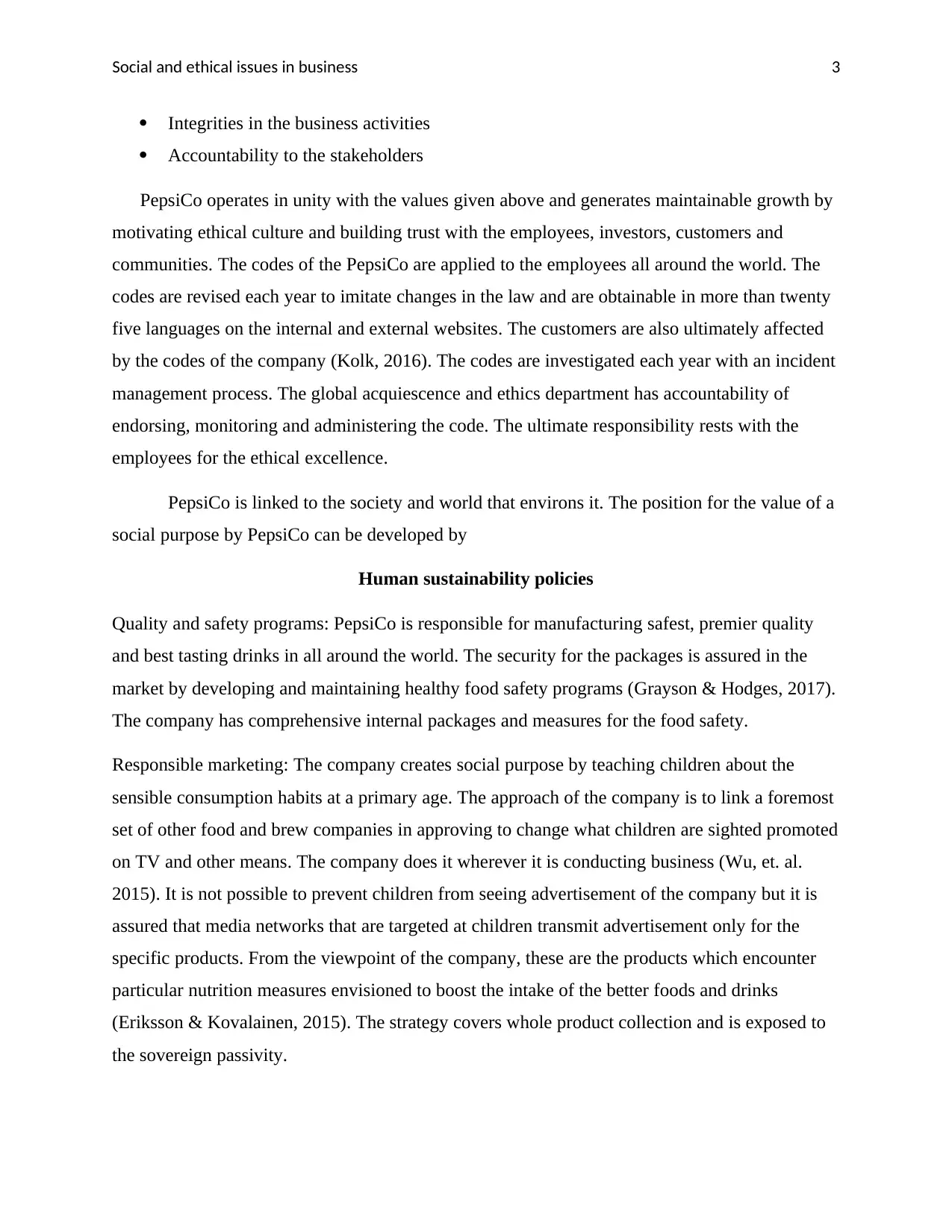
Social and ethical issues in business 3
Integrities in the business activities
Accountability to the stakeholders
PepsiCo operates in unity with the values given above and generates maintainable growth by
motivating ethical culture and building trust with the employees, investors, customers and
communities. The codes of the PepsiCo are applied to the employees all around the world. The
codes are revised each year to imitate changes in the law and are obtainable in more than twenty
five languages on the internal and external websites. The customers are also ultimately affected
by the codes of the company (Kolk, 2016). The codes are investigated each year with an incident
management process. The global acquiescence and ethics department has accountability of
endorsing, monitoring and administering the code. The ultimate responsibility rests with the
employees for the ethical excellence.
PepsiCo is linked to the society and world that environs it. The position for the value of a
social purpose by PepsiCo can be developed by
Human sustainability policies
Quality and safety programs: PepsiCo is responsible for manufacturing safest, premier quality
and best tasting drinks in all around the world. The security for the packages is assured in the
market by developing and maintaining healthy food safety programs (Grayson & Hodges, 2017).
The company has comprehensive internal packages and measures for the food safety.
Responsible marketing: The company creates social purpose by teaching children about the
sensible consumption habits at a primary age. The approach of the company is to link a foremost
set of other food and brew companies in approving to change what children are sighted promoted
on TV and other means. The company does it wherever it is conducting business (Wu, et. al.
2015). It is not possible to prevent children from seeing advertisement of the company but it is
assured that media networks that are targeted at children transmit advertisement only for the
specific products. From the viewpoint of the company, these are the products which encounter
particular nutrition measures envisioned to boost the intake of the better foods and drinks
(Eriksson & Kovalainen, 2015). The strategy covers whole product collection and is exposed to
the sovereign passivity.
Integrities in the business activities
Accountability to the stakeholders
PepsiCo operates in unity with the values given above and generates maintainable growth by
motivating ethical culture and building trust with the employees, investors, customers and
communities. The codes of the PepsiCo are applied to the employees all around the world. The
codes are revised each year to imitate changes in the law and are obtainable in more than twenty
five languages on the internal and external websites. The customers are also ultimately affected
by the codes of the company (Kolk, 2016). The codes are investigated each year with an incident
management process. The global acquiescence and ethics department has accountability of
endorsing, monitoring and administering the code. The ultimate responsibility rests with the
employees for the ethical excellence.
PepsiCo is linked to the society and world that environs it. The position for the value of a
social purpose by PepsiCo can be developed by
Human sustainability policies
Quality and safety programs: PepsiCo is responsible for manufacturing safest, premier quality
and best tasting drinks in all around the world. The security for the packages is assured in the
market by developing and maintaining healthy food safety programs (Grayson & Hodges, 2017).
The company has comprehensive internal packages and measures for the food safety.
Responsible marketing: The company creates social purpose by teaching children about the
sensible consumption habits at a primary age. The approach of the company is to link a foremost
set of other food and brew companies in approving to change what children are sighted promoted
on TV and other means. The company does it wherever it is conducting business (Wu, et. al.
2015). It is not possible to prevent children from seeing advertisement of the company but it is
assured that media networks that are targeted at children transmit advertisement only for the
specific products. From the viewpoint of the company, these are the products which encounter
particular nutrition measures envisioned to boost the intake of the better foods and drinks
(Eriksson & Kovalainen, 2015). The strategy covers whole product collection and is exposed to
the sovereign passivity.
Paraphrase This Document
Need a fresh take? Get an instant paraphrase of this document with our AI Paraphraser
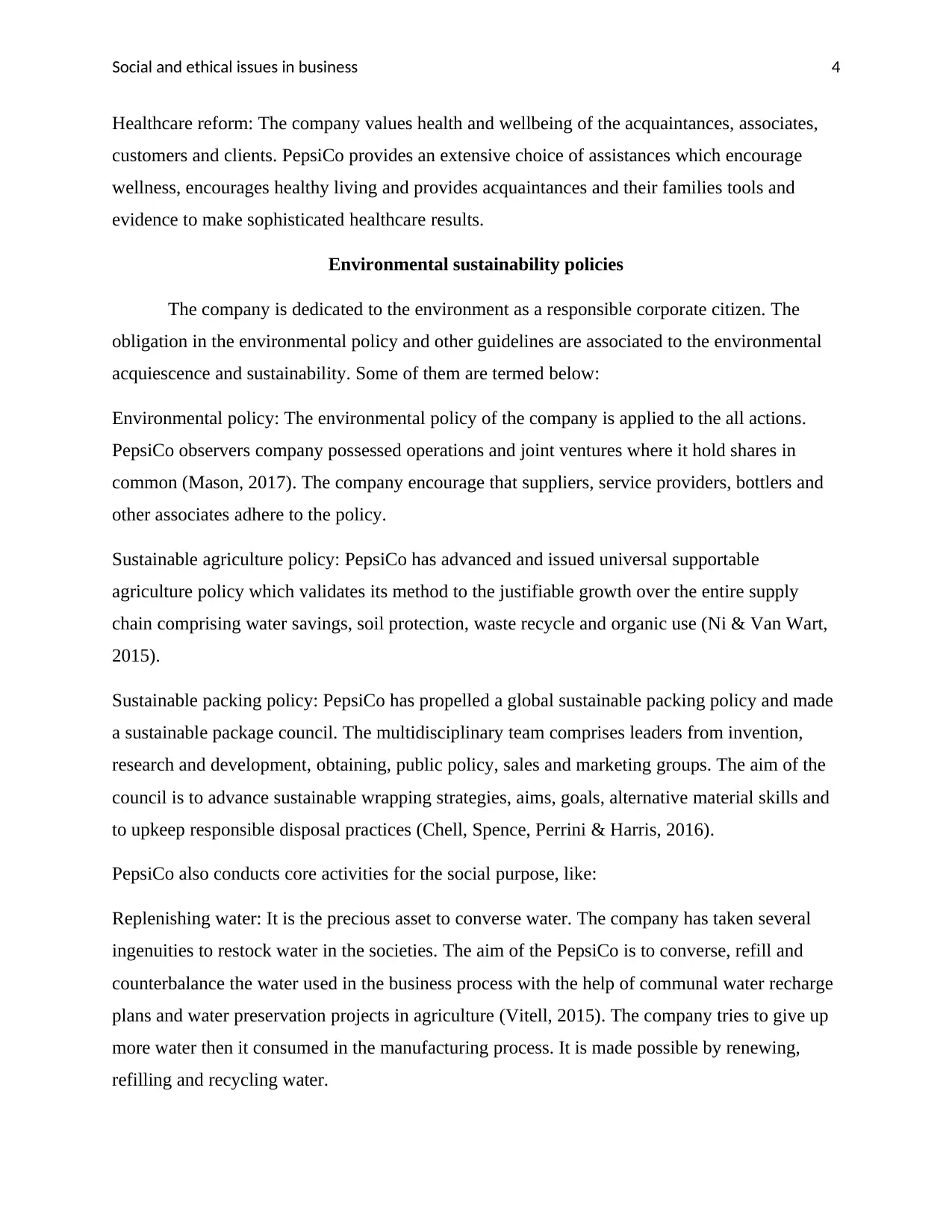
Social and ethical issues in business 4
Healthcare reform: The company values health and wellbeing of the acquaintances, associates,
customers and clients. PepsiCo provides an extensive choice of assistances which encourage
wellness, encourages healthy living and provides acquaintances and their families tools and
evidence to make sophisticated healthcare results.
Environmental sustainability policies
The company is dedicated to the environment as a responsible corporate citizen. The
obligation in the environmental policy and other guidelines are associated to the environmental
acquiescence and sustainability. Some of them are termed below:
Environmental policy: The environmental policy of the company is applied to the all actions.
PepsiCo observers company possessed operations and joint ventures where it hold shares in
common (Mason, 2017). The company encourage that suppliers, service providers, bottlers and
other associates adhere to the policy.
Sustainable agriculture policy: PepsiCo has advanced and issued universal supportable
agriculture policy which validates its method to the justifiable growth over the entire supply
chain comprising water savings, soil protection, waste recycle and organic use (Ni & Van Wart,
2015).
Sustainable packing policy: PepsiCo has propelled a global sustainable packing policy and made
a sustainable package council. The multidisciplinary team comprises leaders from invention,
research and development, obtaining, public policy, sales and marketing groups. The aim of the
council is to advance sustainable wrapping strategies, aims, goals, alternative material skills and
to upkeep responsible disposal practices (Chell, Spence, Perrini & Harris, 2016).
PepsiCo also conducts core activities for the social purpose, like:
Replenishing water: It is the precious asset to converse water. The company has taken several
ingenuities to restock water in the societies. The aim of the PepsiCo is to converse, refill and
counterbalance the water used in the business process with the help of communal water recharge
plans and water preservation projects in agriculture (Vitell, 2015). The company tries to give up
more water then it consumed in the manufacturing process. It is made possible by renewing,
refilling and recycling water.
Healthcare reform: The company values health and wellbeing of the acquaintances, associates,
customers and clients. PepsiCo provides an extensive choice of assistances which encourage
wellness, encourages healthy living and provides acquaintances and their families tools and
evidence to make sophisticated healthcare results.
Environmental sustainability policies
The company is dedicated to the environment as a responsible corporate citizen. The
obligation in the environmental policy and other guidelines are associated to the environmental
acquiescence and sustainability. Some of them are termed below:
Environmental policy: The environmental policy of the company is applied to the all actions.
PepsiCo observers company possessed operations and joint ventures where it hold shares in
common (Mason, 2017). The company encourage that suppliers, service providers, bottlers and
other associates adhere to the policy.
Sustainable agriculture policy: PepsiCo has advanced and issued universal supportable
agriculture policy which validates its method to the justifiable growth over the entire supply
chain comprising water savings, soil protection, waste recycle and organic use (Ni & Van Wart,
2015).
Sustainable packing policy: PepsiCo has propelled a global sustainable packing policy and made
a sustainable package council. The multidisciplinary team comprises leaders from invention,
research and development, obtaining, public policy, sales and marketing groups. The aim of the
council is to advance sustainable wrapping strategies, aims, goals, alternative material skills and
to upkeep responsible disposal practices (Chell, Spence, Perrini & Harris, 2016).
PepsiCo also conducts core activities for the social purpose, like:
Replenishing water: It is the precious asset to converse water. The company has taken several
ingenuities to restock water in the societies. The aim of the PepsiCo is to converse, refill and
counterbalance the water used in the business process with the help of communal water recharge
plans and water preservation projects in agriculture (Vitell, 2015). The company tries to give up
more water then it consumed in the manufacturing process. It is made possible by renewing,
refilling and recycling water.
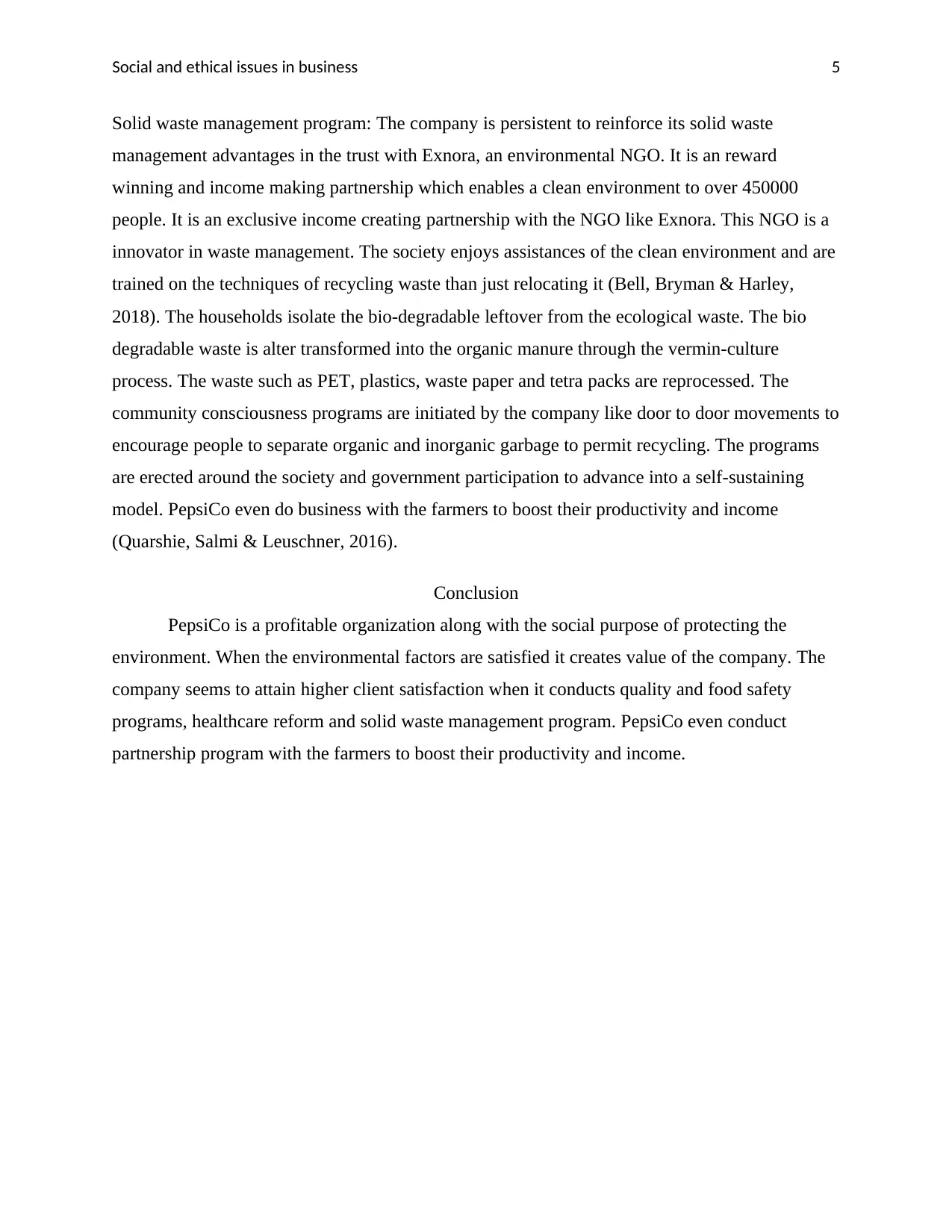
Social and ethical issues in business 5
Solid waste management program: The company is persistent to reinforce its solid waste
management advantages in the trust with Exnora, an environmental NGO. It is an reward
winning and income making partnership which enables a clean environment to over 450000
people. It is an exclusive income creating partnership with the NGO like Exnora. This NGO is a
innovator in waste management. The society enjoys assistances of the clean environment and are
trained on the techniques of recycling waste than just relocating it (Bell, Bryman & Harley,
2018). The households isolate the bio-degradable leftover from the ecological waste. The bio
degradable waste is alter transformed into the organic manure through the vermin-culture
process. The waste such as PET, plastics, waste paper and tetra packs are reprocessed. The
community consciousness programs are initiated by the company like door to door movements to
encourage people to separate organic and inorganic garbage to permit recycling. The programs
are erected around the society and government participation to advance into a self-sustaining
model. PepsiCo even do business with the farmers to boost their productivity and income
(Quarshie, Salmi & Leuschner, 2016).
Conclusion
PepsiCo is a profitable organization along with the social purpose of protecting the
environment. When the environmental factors are satisfied it creates value of the company. The
company seems to attain higher client satisfaction when it conducts quality and food safety
programs, healthcare reform and solid waste management program. PepsiCo even conduct
partnership program with the farmers to boost their productivity and income.
Solid waste management program: The company is persistent to reinforce its solid waste
management advantages in the trust with Exnora, an environmental NGO. It is an reward
winning and income making partnership which enables a clean environment to over 450000
people. It is an exclusive income creating partnership with the NGO like Exnora. This NGO is a
innovator in waste management. The society enjoys assistances of the clean environment and are
trained on the techniques of recycling waste than just relocating it (Bell, Bryman & Harley,
2018). The households isolate the bio-degradable leftover from the ecological waste. The bio
degradable waste is alter transformed into the organic manure through the vermin-culture
process. The waste such as PET, plastics, waste paper and tetra packs are reprocessed. The
community consciousness programs are initiated by the company like door to door movements to
encourage people to separate organic and inorganic garbage to permit recycling. The programs
are erected around the society and government participation to advance into a self-sustaining
model. PepsiCo even do business with the farmers to boost their productivity and income
(Quarshie, Salmi & Leuschner, 2016).
Conclusion
PepsiCo is a profitable organization along with the social purpose of protecting the
environment. When the environmental factors are satisfied it creates value of the company. The
company seems to attain higher client satisfaction when it conducts quality and food safety
programs, healthcare reform and solid waste management program. PepsiCo even conduct
partnership program with the farmers to boost their productivity and income.
⊘ This is a preview!⊘
Do you want full access?
Subscribe today to unlock all pages.

Trusted by 1+ million students worldwide
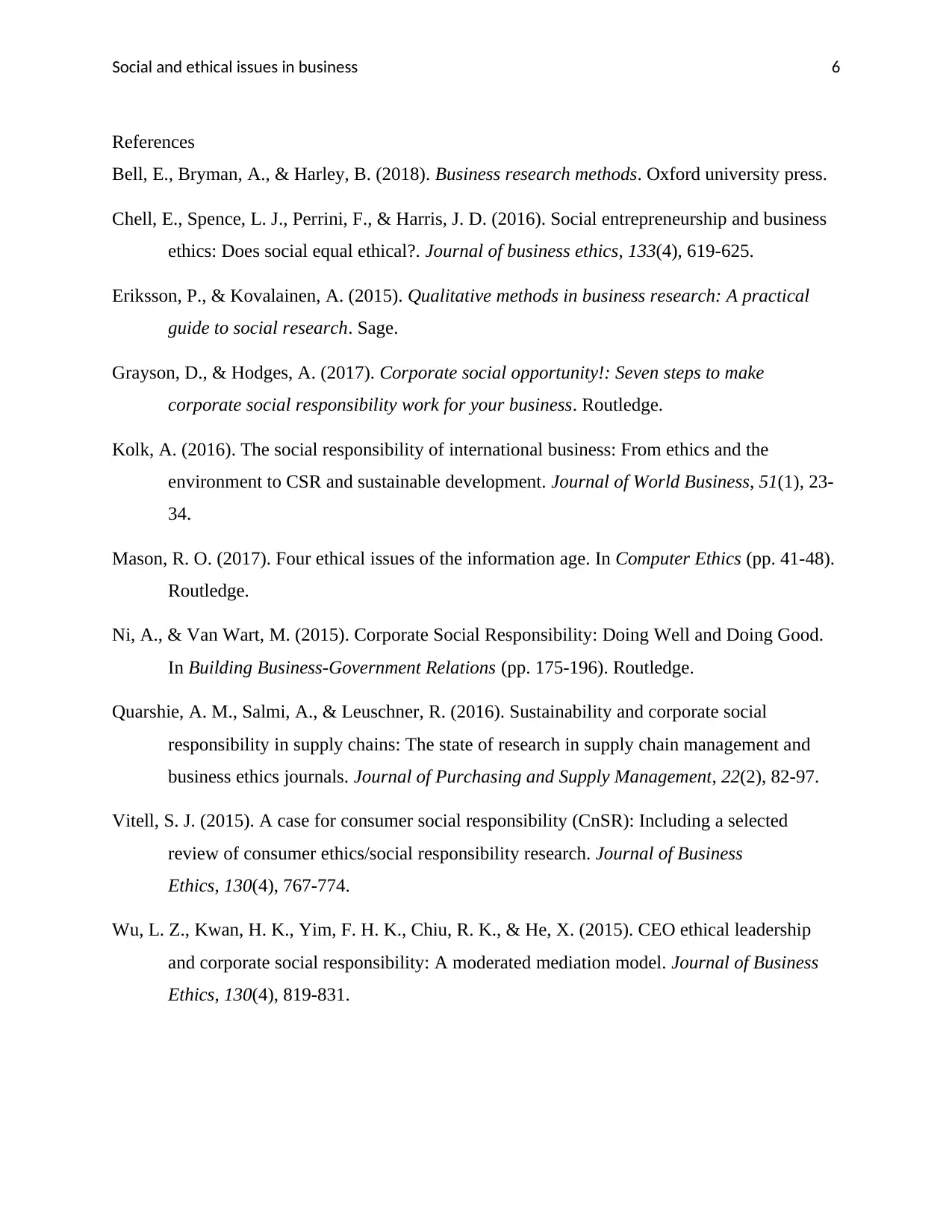
Social and ethical issues in business 6
References
Bell, E., Bryman, A., & Harley, B. (2018). Business research methods. Oxford university press.
Chell, E., Spence, L. J., Perrini, F., & Harris, J. D. (2016). Social entrepreneurship and business
ethics: Does social equal ethical?. Journal of business ethics, 133(4), 619-625.
Eriksson, P., & Kovalainen, A. (2015). Qualitative methods in business research: A practical
guide to social research. Sage.
Grayson, D., & Hodges, A. (2017). Corporate social opportunity!: Seven steps to make
corporate social responsibility work for your business. Routledge.
Kolk, A. (2016). The social responsibility of international business: From ethics and the
environment to CSR and sustainable development. Journal of World Business, 51(1), 23-
34.
Mason, R. O. (2017). Four ethical issues of the information age. In Computer Ethics (pp. 41-48).
Routledge.
Ni, A., & Van Wart, M. (2015). Corporate Social Responsibility: Doing Well and Doing Good.
In Building Business-Government Relations (pp. 175-196). Routledge.
Quarshie, A. M., Salmi, A., & Leuschner, R. (2016). Sustainability and corporate social
responsibility in supply chains: The state of research in supply chain management and
business ethics journals. Journal of Purchasing and Supply Management, 22(2), 82-97.
Vitell, S. J. (2015). A case for consumer social responsibility (CnSR): Including a selected
review of consumer ethics/social responsibility research. Journal of Business
Ethics, 130(4), 767-774.
Wu, L. Z., Kwan, H. K., Yim, F. H. K., Chiu, R. K., & He, X. (2015). CEO ethical leadership
and corporate social responsibility: A moderated mediation model. Journal of Business
Ethics, 130(4), 819-831.
References
Bell, E., Bryman, A., & Harley, B. (2018). Business research methods. Oxford university press.
Chell, E., Spence, L. J., Perrini, F., & Harris, J. D. (2016). Social entrepreneurship and business
ethics: Does social equal ethical?. Journal of business ethics, 133(4), 619-625.
Eriksson, P., & Kovalainen, A. (2015). Qualitative methods in business research: A practical
guide to social research. Sage.
Grayson, D., & Hodges, A. (2017). Corporate social opportunity!: Seven steps to make
corporate social responsibility work for your business. Routledge.
Kolk, A. (2016). The social responsibility of international business: From ethics and the
environment to CSR and sustainable development. Journal of World Business, 51(1), 23-
34.
Mason, R. O. (2017). Four ethical issues of the information age. In Computer Ethics (pp. 41-48).
Routledge.
Ni, A., & Van Wart, M. (2015). Corporate Social Responsibility: Doing Well and Doing Good.
In Building Business-Government Relations (pp. 175-196). Routledge.
Quarshie, A. M., Salmi, A., & Leuschner, R. (2016). Sustainability and corporate social
responsibility in supply chains: The state of research in supply chain management and
business ethics journals. Journal of Purchasing and Supply Management, 22(2), 82-97.
Vitell, S. J. (2015). A case for consumer social responsibility (CnSR): Including a selected
review of consumer ethics/social responsibility research. Journal of Business
Ethics, 130(4), 767-774.
Wu, L. Z., Kwan, H. K., Yim, F. H. K., Chiu, R. K., & He, X. (2015). CEO ethical leadership
and corporate social responsibility: A moderated mediation model. Journal of Business
Ethics, 130(4), 819-831.
1 out of 7
Related Documents
Your All-in-One AI-Powered Toolkit for Academic Success.
+13062052269
info@desklib.com
Available 24*7 on WhatsApp / Email
![[object Object]](/_next/static/media/star-bottom.7253800d.svg)
Unlock your academic potential
Copyright © 2020–2026 A2Z Services. All Rights Reserved. Developed and managed by ZUCOL.





